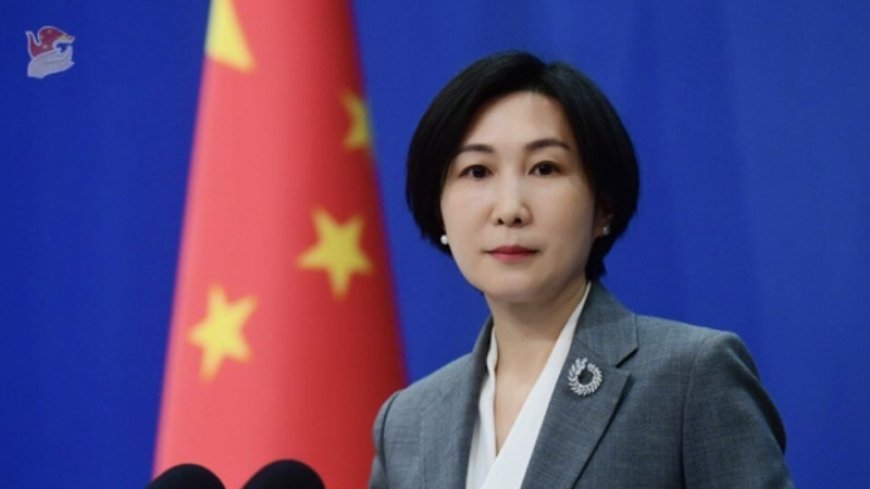Beijing appreciates the statements made by many countries in support of the one-China stance
Taiwan’s general election has highlighted the issue of Taiwan’s independence. The Chinese Ministry of Foreign Affairs expresses its appreciation for the principled stance of many countries, including Iran, who have publicly stated their support for the one-China principle, respect for China’s territorial integrity, and opposition to interference in China’s internal affairs.

Ahead of Taiwan's election on January 13, the Chinese government has described it as a choice for the Taiwanese people between war and peace. Lai Ching-te (DPP), who was elected leader of Taiwan with 40.1% of the vote in this election, is viewed by Beijing as a Taiwan independence separatist. Lai Ching-te stated that he intends to maintain the status quo across the Taiwan Strait and participate in dialogue and cooperation with China to create a peaceful and prosperous environment in the form of "equality and dignity." China announced that the ruling party in Taiwan cannot represent the mainstream of Taiwan's public opinion after failing to win a majority of votes (more than 50% of the votes). Foreign Ministry spokesperson Mao Ning said: Taiwan’s elections are China’s local affairs. China has always firmly opposed any form of official exchanges between the United States and Taiwan, and firmly opposed the United States interfering in Taiwan affairs in any way and under any pretext. We urge the U.S. to recognize the extreme complexity and sensitivity of the Taiwan issue, earnestly abide by the one-China principle and the three China-U.S. joint communiqués, and reaffirm the U.S. leaders' repeated statements that they do not support "Taiwan independence" or "two Chinas" or "one China, one Taiwan" and not seeking to use the Taiwan issue as a tool to contain China. We will implement our commitments such as handling Taiwan-related issues with caution, not hollowing out the one-China principle in any form, and not giving in to "Taiwan independence" separatist forces. Signal any errors. Taiwan’s elections are China’s local affairs. Regardless of the outcome of the election, it will not change the basic fact that there is only one China in the world and Taiwan is part of China, nor will it change the general consensus of the international community to adhere to the one-China principle. Both sides of the Taiwan Strait belong to one China, and Taiwan is part of China's territory. 80 years ago, China, the United States and the United Kingdom issued the Cairo Declaration, which clearly stipulated that "Taiwan, the Chinese territory stolen by Japan, should be returned to China." After that, Article 8 of the "Potsdam Declaration" jointly issued by China, the United States, Britain and the Soviet Union in 1945 stipulated that "the provisions of the Cairo Declaration will be implemented." Japan accepted the Potsdam Declaration and declared unconditional surrender. This series of documents with international legal effect laid the historical and legal foundation that Taiwan is an inalienable territory of China. Although the two sides of the Taiwan Strait have not yet been reunified, China's sovereignty and territory have never been divided, and the legal status and fact that Taiwan is part of China's territory have never changed. This is the real status quo of the Taiwan Strait issue. China will eventually achieve complete reunification and Taiwan will return to the embrace of the motherland. A divisible part, the international community also supports this issue. According to Yitong News Agency, Chinese Foreign Ministry Spokesperson Mao Ning mentioned in his speech that Iran, Pakistan, Maldives, Myanmar, Syria, Tunisia, Palestine, Turkmenistan, Kyrgyzstan, Armenia, Azerbaijan, Central Africa, Niger, Equatorial Guinea, A large number of countries including Comoros, Lesotho, Somalia, Djibouti, Mali, Burundi, Gambia, Vanuatu, Tonga, Kiribati, Dominica, Nicaragua, Bolivia, and the African Union have clearly expressed their support for the one-China principle and their opposition to "Taiwan independence." voice. A spokesman for the Chinese Ministry of Foreign Affairs also said: We express our appreciation and gratitude to these countries and organizations for their just stance. While China expresses its gratitude to the above-mentioned countries, the United States and some of its allies are congratulating Lai Qingde, a "pragmatic Taiwan independence worker" and "Taiwan independence golden grandson" in China's eyes, for his victory. Beijing considers Taiwan part of China's territory and will unify the island by force if necessary. Chinese Defense Ministry spokesman Zhang Xiaogang said Beijing would "smash" any formal declaration of Taiwan's independence, saying nothing, not even the United States selling arms to Taiwan, could prevent cross-strait reunification. Earlier, Chinese President Xi Jinping said that the island of Taiwan will undoubtedly be integrated with its mainland (China). The U.S. government severed ties with Taiwan in 1979 after recognizing the People's Republic of China, but Washington has maintained informal relations with Taipei since then.













































